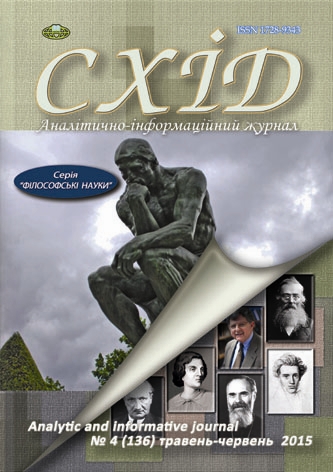Ratio of the gnoseological and soterologic in Christian teaching on truth
DOI:
https://doi.org/10.21847/1728-9343.2015.4(136).48345Keywords:
Christianity, truth, science, civilization, council, soteriology, epistemologyAbstract
The article is devoted to the Genesis and essence of the Christian teaching about the truth, according to its epistemological aspect from soteriological. The huge attention given by Christian theologians to the question of truth, due to the fact that a particular epistemological truth in the Christian consciousness correlates with the ontological truth that is eternally present in the divine essence, and in the person of Christ was incarnated and became complete available to the people. The author thinks that a Christian, and not an ancient understanding of the truth became the basis for the formation of scientific ontology, and Christian collegiate method of proclaiming the truth subsequently, in a secularized form, has become a benchmark for the scientific community. The main attention is paid to the analysis of the statements of the early Christian theologians on issues of truth, as well as the formation of a collegiate way of proclaiming the truth on behalf of the entire Church at the councils.
Downloads
References
Augustin Aurelius (2000), On the true religion, Works, V.1., Aletheia, S-Petersburg, pp. 394-468 (rus).
Afonasin E. (2002), The antique gnosticism, Oleg Abyshko Press, S-Petersburg, 368 p. (rus).
Dionysius the Areopagite (2010), On the divine names, Corpus of the works, Oleg Abyshko Press, S-Petersburg, pp. 121-309 (rus).
Isaak The Syrian (1993), Word 40, The works of st. Isaak The Syrian, Pravilo very, Moscow, pp. 167-170 (rus).
Karsavin L. (1994), The Saint Fathers and the Church teachers (Opening of the Orthodoxy in their works), MSU Publisher, Moscow, 176 p. (rus).
Moreschini C. (2011), Storia della filosofia patristica, Greek-Latin cabinete of Yu. Shichalin, Moscow, 864 p. (rus).
Origen (2009), On The Principles in: Anthology of the East-Christian theological thought: orthodoxy and heterodoxy, V.1., Niceya, S-Petersburg, pp. 83-96. (rus).
Posnov М. (1994), History of the Christian Church, Life with God, Brussels, 614 p. (rus).
Savrey V. (2011), Alexandrian school in the history of philosophical-theological thought, ComKniga, Moscow, 1008 p. (rus).
Sokolov V. (1979), History of Middle Ages Philosophy, High School, Мoscow, 448 p. (rus).
Heidegger М. (2009), Parmenides, Vladimir Dal, S-Petersburg, 384 p. (rus).
Khalikov R. (2013), Changeover from apostolicity to episcopacy as a form of rationalization of the Christian tradition, Skhid, № 5, pp. 203-208 (ukr).
Hägglund B. (2001), History of Theology, Torch, S-Petersburg, 370 p. (rus).
Hall S. J. (2000), Doctrine and Practice in the Early Church, Posoh, Novosybirsk, 324 p. (rus).
Chornomorets Yu. (2010), Byzantine Neoplatonism from Dionysius the Areopagite to Gennadios Scholarios, Dukh i Litera, Kyiv, 568 p. (ukr).
Martin S. (2006), The Gnostics: The First Christian Heretics, Pocket Essentials, Harpenden, 160 p. (eng).
Sleeman J. H., Pollet G. (1980), Lexicon Plotinianum, Brill, Leiden, 1164 p. (eng).
Downloads
Published
How to Cite
Issue
Section
License
Copyright (c) 2015 Tetiana Yeroshenko

This work is licensed under a Creative Commons Attribution-NonCommercial-NoDerivatives 4.0 International License.
1. Authors bear responsibility for the accuracy of facts, quotations, numbers and names used.
2. Manuscripts are not sent back.
3. The publisher does not always agree with the authors' opinion.
4. The authors reserve the right to authorship of the work and pass the first publication right of this work to the journal under the terms of a Creative Commons Attribution-NonCommercial-NoDerivatives 4.0 International License. This license allows others to distribute (copy) the published work for non-commercial purposes, provided there is mandatory attribution to its authors and a link to the first publication in our journal.
5. The authors have the right to conclude separate supplement agreements that relate to non-exclusive work distribution in the form in which it has been published by the journal (for example, to upload the work to the online storage of the journal or publish it as part of a monograph), provided that the reference to the first publication of the work in this journal is included.

